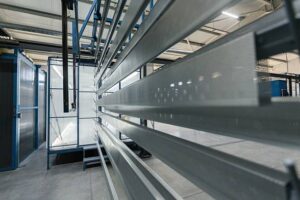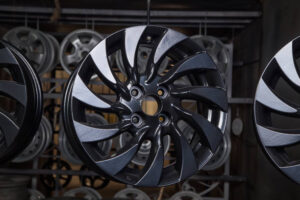In industrial and construction projects, efficiency and safety are essential for ensuring smooth operations and reducing risks. Custom metal fabrication allows businesses to design and build components tailored to their specific needs, offering unique advantages over standard, off-the-shelf parts. Let’s explore how custom metal fabrication boosts both efficiency and safety, making it a smart choice for specialized projects.
1. Precision-Fitted Components for Improved Efficiency
Custom fabrication produces parts that match precise specifications, allowing for perfect integration with your existing setup. This level of fit reduces installation time, prevents alignment issues, and minimizes the need for on-site adjustments. Properly fitted components support smoother operations, improve load distribution, and reduce wear on adjacent parts. For example, a precisely fabricated bracket or support can reduce stress on critical components, enhancing performance and reducing maintenance. This precision not only saves time but also lowers operational costs, making the entire workflow more efficient.
2. Increased Durability and Longevity
In custom metal fabrication, materials, and coatings are chosen based on the demands of the specific application, resulting in highly durable parts. This durability reduces the frequency of part replacements and lowers long-term maintenance costs. For instance, fabricating components for high-heat environments with heat-resistant alloys can help avoid overheating issues. Similarly, using corrosion-resistant coatings on parts exposed to moisture extends their lifespan and reduces downtime. Stronger, tailored components enhance operational reliability, withstanding harsh environments far better than standard parts, which means reduced interruptions and better productivity over time.
3. Enhanced Safety with Tailored Designs
Custom metal fabrication allows for safety-focused designs that address specific hazards in the workplace. For instance, custom guardrails, safety enclosures, or machine barriers can be built to precise dimensions, providing optimal protection for workers around hazardous machinery. Tailoring these parts to fit machinery or equipment exactly reduces the chance of accidents and ensures compliance with safety regulations. Custom safety designs also allow for improvements, such as adding anti-slip surfaces on walkways or reinforcing edges to prevent accidental contact with sharp areas, creating a safer work environment overall.
4. Streamlined Workflow and Reduced Downtime
When components are custom-made to meet specific operational needs, they are more likely to withstand the stresses of everyday use. Custom parts integrate seamlessly with your systems, reducing the risk of unexpected shutdowns or delays. With components designed to handle particular load cycles, vibrations, or impacts, you experience fewer interruptions, helping maintain consistent productivity. For example, a custom-fabricated conveyor system part designed for heavy loads will last longer and perform more efficiently, lowering downtime associated with frequent part replacements.
5. Adaptability to Future Modifications
As operations evolve, equipment may need adjustments to accommodate new demands. Custom-fabricated components can often be modified to fit new configurations, saving time and money on complete replacements. Unlike standard parts, custom fabrications are adaptable, allowing you to expand or reconfigure existing setups as needed. This adaptability makes it easier to scale operations or integrate new technologies. For example, if a production line needs a different layout, custom parts can be refitted or expanded rather than replaced, giving you flexibility without a major overhaul.
6. Compliance with Industry Standards
A reliable custom metal fabrication partner ensures all parts meet industry-specific safety, environmental, and performance standards. Fabricating components in compliance with these standards not only enhances project safety but also reduces risks associated with non-compliance, such as fines or operational shutdowns. Custom fabrication companies work with you to understand regulatory requirements and integrate compliance directly into the design, ensuring that every component is up to code. This compliance helps you avoid liability issues, improves workplace safety, and builds trust with stakeholders.
7. Long-Term Cost Savings
While custom fabrication often has a higher upfront cost, it offers substantial long-term savings. Custom components are more durable, efficient, and reliable, which reduces the need for frequent repairs and replacements. This lowers operational expenses and minimizes downtime, giving you a better return on investment. For example, investing in high-strength custom components for a production line may prevent costly shutdowns due to wear and tear. Over time, the savings from reduced maintenance and increased productivity more than offset the initial investment, making custom fabrication a wise financial decision.
Conclusion
Custom metal fabrication enhances project efficiency, safety, and adaptability, providing purpose-built components that support specific operational needs. Working with an experienced fabrication partner allows you to maximize productivity, improve safety, and achieve significant cost savings over time, making custom metal fabrication a valuable asset in complex industrial and construction projects.



